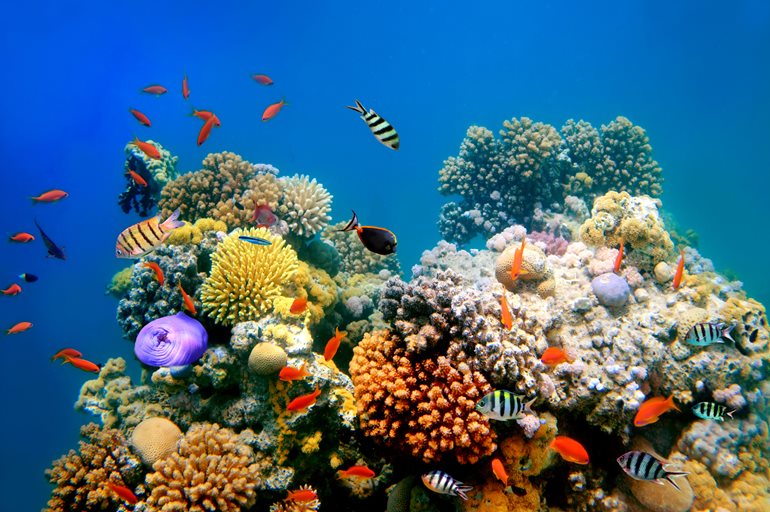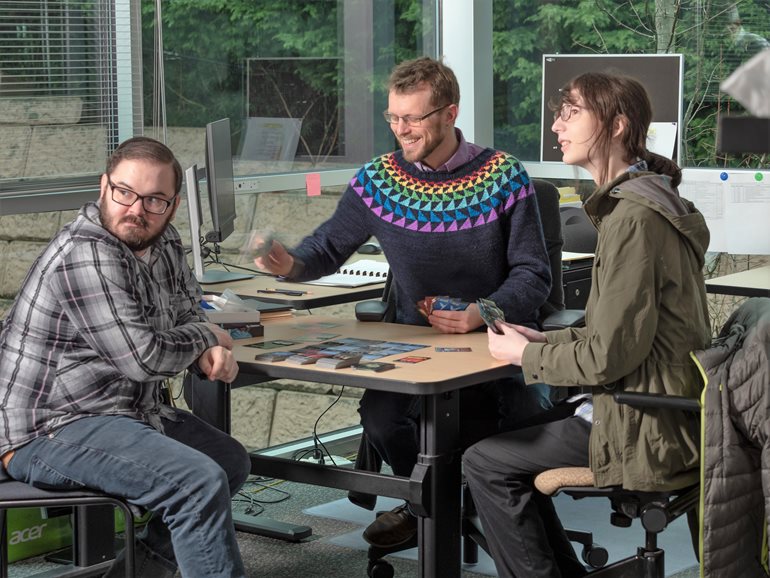
Jesse Zaneveld, an assistant professor in the School of STEM’s Division of Biological Sciences, has received a National Science Foundation CAREER award worth more than $940,000 over five years to support his research in coral reef microbiology.
The research uses data that Zaneveld and others compiled when he was a research fellow at Oregon State University. It’s known as the Global Coral Microbiome Project.
“I’m humbled and grateful for the support from the people in my division, the research office and my mentors,” Zaneveld said.
The CAREER award recognizes early career faculty who combine innovation in research and teaching. UW Bothell faculty have received six of the prestigious awards in the past seven years, said Carolyn Brennan, the assistant vice chancellor for research.
A world of complex corals
Corals are known for their hard skeletons that build reefs in shallow tropical waters. Reefs offer shelter to many fish and other marine species and are thus critical to the natural environment. They protect shorelines and serve as an indicator of water quality. They are also are important to local economies.
There are about 1,500 species of corals in different shapes and colors. Most are a long way from UW Bothell, but Zaneveld has a personal interest.
“My parents sold everything they owned and bought this little 32-foot fiberglass sloop and sailed across the South Pacific until I was 5 and my brother was born in New Zealand,” he said. “And that little boat that my dad couldn’t even stand up in, except in one spot, got quite a bit too small.”
After a break, the family resumed sailing across the Pacific during Zaneveld’s high school summers. Those ocean-going experiences provide mental images of the world of corals. Like the anemones that beachgoers might see on the Washington coast, small polyps inside the coral skeletons gather particles from the water.
As humans have microorganisms, such as bacteria, in their gut that affect how they metabolize food or react to drugs, corals also have microorganisms living in and on their bodies that give them nutrients and color, among other things.
“We’ve got these beautiful coral reefs, and they all depend on symbiosis with microorganisms to survive,” Zaneveld said.
Learning how corals regulate their microbiome is important for understanding how corals respond to environmental stress, such as warming water or nutrient pollution, he said, noting that stress can lead to disease, decline and a mass die-off known as bleaching as reef colors fade.
Also, like humans, corals have immune systems that play an important role in keeping out harmful bacteria, he said.
“We want to test whether the coral species that get lots of diseases have different microbes from the ones that get few diseases,” Zaneveld said. “And then we want to relate that back to the immune system.”
Undergraduate research opportunity
Zaneveld has been at UW Bothell since 2016 and teaches Evolution, Investigative Biology, Computational Biology and Bioinformatics.
He also brings undergraduate students into his research, giving them a deeper learning experience.
Yttria Aniseia is a junior majoring in Applied Computing who is planning to pursue a doctorate in bioinformatics or computational biology. She connected with Zaneveld through an Undergraduate Research Fair. “Working with his lab showed me that there was a lot more to biology to learn,” Aniseia said.
Dylan Sonett, a senior majoring in Biology, heard about Zaneveld’s research in one of his classes. Sonett admits he’s not attached to coral, per se, but he likes the puzzle-solving pleasure of data analysis.
“I have discovered a love for research, exploring datasets and asking questions that nobody has thought to ask. When you’re the first person to answer that question, that’s incredible,” said Sonett, who is applying for medical school.
“I think I’ve learned almost as much about statistics from work in this lab as I have from statistics classes,” he said, “because I’ve had to implement them and run my own tests and work with the data.”
Educational board game

Part of the CAREER grant supports development of a board game called Reef Scenarios that Zaneveld hopes will become an educational tool about climate change, water quality and overfishing. He already has a prototype he demonstrated in his office to Aniseia and Sonett.
“I thought the interactions would translate into a board game and would be a way to share some of those ideas and teach about coral reefs,” he said.
Players in the game represent corals and algae competing for the same space. Playing the whole game as designed takes about 90 minutes. Zaneveld plans to use shorter scenarios in a classroom.
Understanding the connections between immunity and the microbiome on corals will help fill in a critical piece of how symbiosis between microorganisms and animals — including humans — evolved, Zaneveld said.
“We’re trying, very broadly, to understand the rules for how microorganisms and their hosts interact,” he said, “and that’s important for our general understanding of symbiosis and immunity across the animal tree of life.”



